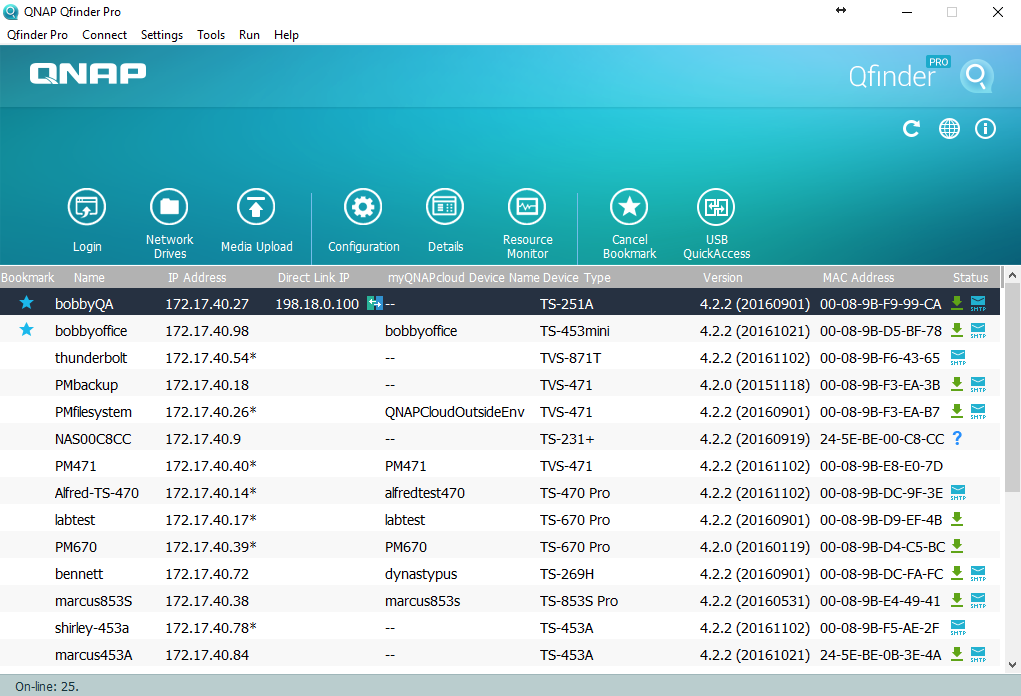
- #Qnap finder windows 10 install
- #Qnap finder windows 10 driver
- #Qnap finder windows 10 upgrade
- #Qnap finder windows 10 password
#Qnap finder windows 10 driver
Docker containers exhausts space due to the json-fileĭocker’s default logging driver is json-file, which performs no log rotation by default. If using a docker-compose.yml file, the shm_size key can be used for this If using docker run, this can be done by passing the flag -shm-size 256m. Solution to fix this problem is to increase the size of shared memory to at least 256MB. Other than disabling the Prometheus Metrics from the Admin Area, the recommended Writing value to /dev/shm/gitlab/sidekiq/histogram_sidekiq_0-0.db failed with unmapped file Writing value to /dev/shm/gitlab/sidekiq/gauge_all_sidekiq_0-1.db failed with unmapped file To the gitlab-backup restore command line arguments.

SKIP=artifacts,repositories,registry,uploads,builds,pages,lfs,packages,terraform_state Only the database must be restored, so add
#Qnap finder windows 10 upgrade
Downgrade GitLabįollow the upgrade procedure, but specify the tag for the original version of GitLab However, reuse the CE container name, port and file mappings, and version. Replace ce with ee in your docker run command or docker-compose.yml file. To create a new container with GitLab EE, Stop the current CE container, and remove or rename it. The following steps assume that you are upgrading the same version. This is not explicitly necessary, and any standard upgrade (for example, CE 14.0 to EE 14.1) should work. We recommend you convert from the same version of CE to EE (for example, CE 14.1 to EE 14.1). Using the same approach as upgrading the version. To a GitLab Enterprise Edition (EE) container You can convert an existing Docker-based GitLab Community Edition (CE) container Convert Community Edition to Enterprise Edition If you have used tags instead, you’ll need GitLab container by modifying the -publish flag. You can make Docker to use your IP address and forward all traffic to the The GitLab version you want to run, for example gitlab/gitlab-ee:12.1.3-ce.0. To use a specific tagged version, replace gitlab/gitlab-ee:latest with Tagged versions of the GitLab Docker images are also provided. Note that every time you execute a docker run command, you need to provide Sudo docker run -detach \ -hostname \ -env GITLAB_OMNIBUS_CONFIG = "external_url '' gitlab_rails = true " \ -publish 443:443 -publish 80:80 -publish 22:22 \ -name gitlab \ -restart always \ -volume $GITLAB_HOME/config:/etc/gitlab \ -volume $GITLAB_HOME/logs:/var/log/gitlab \ -volume $GITLAB_HOME/data:/var/opt/gitlab \ -shm-size 256m \ Here’s an example that deploys GitLab with four runners as a stack, using secrets and configurations:
#Qnap finder windows 10 password
Secrets can be used to securely pass your initial root password without exposing it as an environment variable.Ĭonfigurations can help you to keep your GitLab image as generic as possible. In swarm mode you can leverage Docker secretsĪnd Docker configurations to efficiently and securely deploy your GitLab instance.
#Qnap finder windows 10 install
Install GitLab using Docker swarm modeĭocker-based GitLab installation in a swarm cluster. This is the same as using -publish 8929:8929 -publish 2224:22. Version : ' 3.6' services : web : image : ' gitlab/gitlab-ee:latest' restart : always hostname : ' ' environment : GITLAB_OMNIBUS_CONFIG : | external_url '' gitlab_rails = 2224 ports : - ' 8929:8929' - ' 2224:22' volumes : - ' $GITLAB_HOME/config:/etc/gitlab' - ' $GITLAB_HOME/logs:/var/log/gitlab' - ' $GITLAB_HOME/data:/var/opt/gitlab' shm_size : ' 256m' In the following examples, if you want to use the latest RC image, use As another option, you can install an MTA directly in the GitLabĬontainer, but this adds maintenance overhead as you’ll likely need to reinstall

Solution is to add an MTA (such as Postfix or Sendmail) running in a separateĬontainer. The Docker images don’t include a mail transport agent (MTA). If you instead want to install GitLabįind the GitLab official Docker image at: Necessary services in a single container. The GitLab Docker images are monolithic images of GitLab running all the Buffer overflow error when starting Docker GitLab Docker images.



 0 kommentar(er)
0 kommentar(er)
